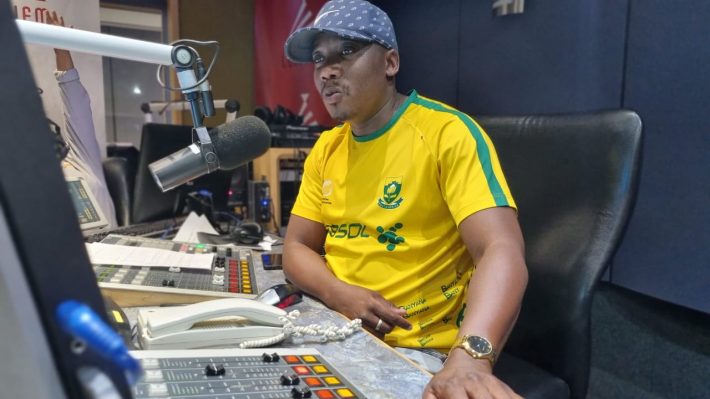Whatever prejudices Sesotho presenters may face in agency boardrooms and radio awards adjudication panels, Lesedi FM’s Thabo Mokone still has faith in Sesotho’s commercial appeal, writes Ace Moloi.
Language is more than just a medium of communication; it’s a conveyor belt of culture, wisdom and pride. Although in South Africa we usually talk about these ‘native’ things only in September, which we’ve branded Heritage Month, truth is that the conversation must never die, especially in a country with an identity plundered by centuries of colonialism and apartheid.
Nearly three decades since (political) freedom, we must constantly challenge ourselves to reflect on how best we’ve transformed institutions of power to look and feel like us. In a recent paper on Democracy, Language and Inclusive Education in the African Context, Professor Kwesi Kwaa Prah has written that “language stands at the heart of the culture concept” and that “the inability or ability to speak a colonial language” in Africa is sadly used as a measure of superiority or inferiority.
This troubling social reality is also prevalent in broadcast media and the arts. A radio career, for example, tends to be more rewarding when the jock announces in English than, say, Sesotho. Such a presenter is most likely to increase their social currency, which often translates into financial gain.
This is what makes radio jocks like Thabo Mokone daring in their decisiveness to do radio in Sesotho, despite growing up in Gauteng where only a small fraction of the population (about 11%) speaks the language.
Mokone (40) tells Art State: “I think radio listeners love everything that’s new and different. When you talk about what sets you apart, when you talk about a gap in the market, that’s what I had to think about [when deciding to do Sesotho radio]. For me, it was about making a difference. So, I saw a gap for Sesotho broadcasting.”
The thin percentage of people who speak Sesotho in Gauteng, Africa’s Mecca of commercial activity, means that the market for any media production done in Sesotho is the size of the eye of the needle. Nevertheless, the former Thetha FM breakfast presenter of ten years is proud to have managed to position himself favourably for brands to invest in his then show at Thetha FM, even though he was speaking a minority language in Gauteng. “The fact that I was young and presented in Sesotho was unique at the time, especially because of the style of Sesotho I used, which cut across ages, bringing trending conversations to the listenership in Sesotho.”
Thabo Mokone, endeared as “Bundle of Joy” by his pool of listeners, is currently Lesedi FM’s afternoon drive co-presenter. Teaming up with former Motheo FM personality, Dikeledi Mageseni, they are the voices behind #SkeemSaDrive. The show targets young people of diverse backgrounds through music, education and trending conversations.
Although the station primarily serves the interests of Basotho, Mokone remarks that his style of Sesotho is listener-friendly and accessible to both Basotho and other youth groups who may not necessarily speak the language, but understand it enough to tune in to Lesedi FM.
“The burden of preserving the language is always at the back of my mind, but it doesn’t mean I must use bombastic words. You can speak Sesotho accurately and still be accessible to the listener at the same time,” maintains the motivational Bundle of Joy, who is also Lesedi FM’s Saturday charts show presenter.
Mokone, like many other people who use African languages as their tools of trade, is aware of the pitfalls facing the development of Sesotho. Citing the debated translations of the COVID-19 pandemic terminology, such as “lockdown” and “masks”, he’s of the view that there’s still a long way to go in keeping up with the ever-changing times. “We [Basotho] are slow in our development of Sesotho because we have relied mostly on people we consider as experts,” he notes, adding, “I have a problem when one person claims to know Sesotho better than others.”
Like Mokone, Professor Prah believes that “languages develop because people develop them, the owners of the language purposefully develop them”. Essentially both Prah and Mokone are proposing an inclusive and democratized process of updating language. When there’s ownership of language not only by the “experts” but everyone, there will be less misrepresentations of African languages on TV and in advertising, a recurring sin that causes Mokone to lament categorically; “The people who purport to be producing television shows for Basotho don’t even represent us accurately. They get opportunities to do our things and do them wrong.”
With a thriving radio career that began first as a dream and irrespective of whatever prejudices Sesotho presenters may face in marketing boardrooms and radio awards adjudication panels, Lesedi FM’s Thabo Mokone still has immense faith that today’s generation can create commercially appealing content in their own language, especially since English spaces are saturated.
“It’s just a matter of starting things for ourselves, instead of hoping to catch the train moving. When we say there’s no hope [for Sesotho content creators], it means we’re [only] looking at the current doors being closed on us,” concludes the enthusiastic and innovative broadcaster.
Ace Moloi is the editor of Art State, Careers Magazine’s business developer, broadcaster and freelance writer.






